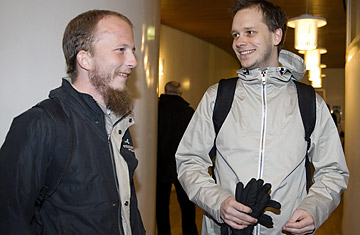
Pirate Bay co-founders Gottfrid Svartholm (L) and Peter Sunde arrive for their trial at Stockholm's city court February 16, 2009.
(3 of 3)
Some scholars say the music and movie companies are wrong to insist on strong ownership interests in copyright. "It doesn't have to be an either/or dichotomy," Professor Neil Netanel of UCLA's School of Law told TIME. "Why not look at copyright as the right to be paid, but not necessarily ownership of the work itself. You could establish a levy on equipment or some other fee that everyone pays that can go to compensate the authors or artists. But the authors (or other copyright holders) wouldn't have the right to keep you from sharing the work."
Netanel made just that proposal in a 2003 article in the Harvard Journal of Law and Technology, arguing that a 4% levee on computers, MP3 players and all other devices used to enjoy digital media would adequately compensate the authors and the companies alike. "And look at all the effort it would save," he says. (See the top 10 gadgets of 2008.)
Fred von Lohmann, the senior copyright lawyer for the Electronic Frontier Foundation in San Francisco, advocates a more gradual approach, keeping much of copyright law intact for video but making radical changes for music, given that the recording industry is suffering much more severely than Hollywood. The key, he says, is to compensate authors and artists while at the same time making room for "disruptive technology to emerge. Some of the developments we have seen have threatened to disrupt existing business models, but that's okay. There would never have been an iTunes store without Napster, and wihtout YouTube we'd never have hulu. So we have to leave room for that."
Meanwhile, the Internet revolutionaries have been busy too. On Thursday, hackers laid siege to a number of sites connected to the plaintiffs, and temporarily sent IFPI.se — the home of an international recording artists' association — off line. Arriving home from the trial, Sunde issued an appeal for his supporters to chill. "Our case is going quite well as most of you have noticed," he wrote on his blog Copy Me Happy. "In the light of that it feels very bad that people are hacking web sites which actually puts us in a worse light than we need to be in. ... Please stop, for our sake. We don't need that kind of support. The Internet is having a fever and this might be a way to get cooled down. But I hope it's over now and that we can go back to winning our case."
Win or lose, Sunde and others have said The Pirate Bay will continue. Its trackers — the digital components that enable users to quickly find media on the Web — have been sent to users in other countries. If the site is closed in Sweden, they've promised it will reappear elsewhere.
That may be true, but the prosecutors and industry plaintiffs are just hoping that by the time The Pirate Bay drops anchor in a new haven the men who have captained the ship in Sweden will be much poorer — and perhaps in prison.
